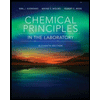
PRINCIPLES OF INSTRUMENTAL ANALYSIS
7th Edition
ISBN: 9789353506193
Author: Skoog
Publisher: CENGAGE L
expand_more
expand_more
format_list_bulleted
Question
thumb_up100%
Chapter 27, Problem 27.8QAP
Interpretation Introduction
Interpretation:
The difference between total-ion chromatogram and mass chromatogram is to be stated.
Concept introduction:
Total-ion chromatogram is formed by adding all the intensities of mass spectral peaks belonging to a scan. Mass chromatogram is formation of mass spectrometry data as chromatogram.
Expert Solution & Answer
Want to see the full answer?
Check out a sample textbook solution
Students have asked these similar questions
Determine if the following salt is neutral, acidic or basic. If acidic or basic, write the appropriate equilibrium equation for the acid or base that exists when the salt is dissolved in aqueous solution. If neutral, simply write only NR. Be sure to include the proper phases for all species within the reaction. NaN₃
Can I please get help with this?
Can I please get help with this?
Chapter 27 Solutions
PRINCIPLES OF INSTRUMENTAL ANALYSIS
Ch. 27 - Prob. 27.1QAPCh. 27 - Prob. 27.2QAPCh. 27 - Prob. 27.3QAPCh. 27 - Prob. 27.4QAPCh. 27 - Prob. 27.5QAPCh. 27 - Prob. 27.6QAPCh. 27 - Prob. 27.7QAPCh. 27 - Prob. 27.8QAPCh. 27 - Prob. 27.9QAPCh. 27 - What are hyphenated GC methods? Briefly describe...
Ch. 27 - Prob. 27.11QAPCh. 27 - Prob. 27.12QAPCh. 27 - Prob. 27.13QAPCh. 27 - Prob. 27.14QAPCh. 27 - Prob. 27.15QAPCh. 27 - Prob. 27.16QAPCh. 27 - Prob. 27.17QAPCh. 27 - Prob. 27.18QAPCh. 27 - Prob. 27.19QAPCh. 27 - The same polar compound is gas chromatographed on...Ch. 27 - Prob. 27.21QAPCh. 27 - Prob. 27.22QAPCh. 27 - Prob. 27.23QAPCh. 27 - Prob. 27.24QAPCh. 27 - Prob. 27.25QAPCh. 27 - Prob. 27.26QAPCh. 27 - Prob. 27.27QAPCh. 27 - Prob. 27.28QAPCh. 27 - Why is GSC not used nearly as extensively as GLC?Ch. 27 - Prob. 27.30QAP
Knowledge Booster
Similar questions
- Use the Henderson-Hasselbalch equation to calculate pH of a buffer containing 0.050M benzoic acidand 0.150M sodium benzoate. The Ka of benzoic acid is 6.5 x 10-5arrow_forwardA. Draw the structure of each of the following alcohols. Then draw and name the product you would expect to produce by the oxidation of each. a. 4-Methyl-2-heptanol b. 3,4-Dimethyl-1-pentanol c. 4-Ethyl-2-heptanol d. 5,7-Dichloro-3-heptanolarrow_forwardWhat is the pH of a 1.0 L buffer made with 0.300 mol of HF (Ka = 6.8 × 10⁻⁴) and 0.200 mol of NaF to which 0.160 mol of NaOH were added?arrow_forward
- Can I please get help with this.arrow_forwardDetermine if the following salt is neutral, acidic or basic. If acidic or basic, write the appropriate equilibrium equation for the acid or base that exists when the salt is dissolved in aqueous solution. If neutral, simply write only NR. Be sure to include the proper phases for all species within the reaction. N₂H₅ClO₄arrow_forwardPlease help me with identifying these.arrow_forward
arrow_back_ios
SEE MORE QUESTIONS
arrow_forward_ios
Recommended textbooks for you
 Principles of Instrumental AnalysisChemistryISBN:9781305577213Author:Douglas A. Skoog, F. James Holler, Stanley R. CrouchPublisher:Cengage Learning
Principles of Instrumental AnalysisChemistryISBN:9781305577213Author:Douglas A. Skoog, F. James Holler, Stanley R. CrouchPublisher:Cengage Learning Macroscale and Microscale Organic ExperimentsChemistryISBN:9781305577190Author:Kenneth L. Williamson, Katherine M. MastersPublisher:Brooks Cole
Macroscale and Microscale Organic ExperimentsChemistryISBN:9781305577190Author:Kenneth L. Williamson, Katherine M. MastersPublisher:Brooks Cole Chemical Principles in the LaboratoryChemistryISBN:9781305264434Author:Emil Slowinski, Wayne C. Wolsey, Robert RossiPublisher:Brooks Cole
Chemical Principles in the LaboratoryChemistryISBN:9781305264434Author:Emil Slowinski, Wayne C. Wolsey, Robert RossiPublisher:Brooks Cole EBK A SMALL SCALE APPROACH TO ORGANIC LChemistryISBN:9781305446021Author:LampmanPublisher:CENGAGE LEARNING - CONSIGNMENT
EBK A SMALL SCALE APPROACH TO ORGANIC LChemistryISBN:9781305446021Author:LampmanPublisher:CENGAGE LEARNING - CONSIGNMENT

Principles of Instrumental Analysis
Chemistry
ISBN:9781305577213
Author:Douglas A. Skoog, F. James Holler, Stanley R. Crouch
Publisher:Cengage Learning


Macroscale and Microscale Organic Experiments
Chemistry
ISBN:9781305577190
Author:Kenneth L. Williamson, Katherine M. Masters
Publisher:Brooks Cole

Chemical Principles in the Laboratory
Chemistry
ISBN:9781305264434
Author:Emil Slowinski, Wayne C. Wolsey, Robert Rossi
Publisher:Brooks Cole

EBK A SMALL SCALE APPROACH TO ORGANIC L
Chemistry
ISBN:9781305446021
Author:Lampman
Publisher:CENGAGE LEARNING - CONSIGNMENT